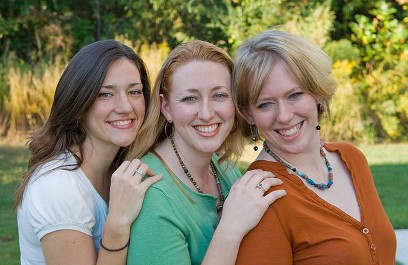María lleva un mes en Londres, está aprendiendo inglés rápidamente. Hoy han llegado sus hermanas para visitarla. Al llegar a casa María le presenta sus hermanas a Anne
|
Maria: Hello Anne!!!!! Anne: Hi Maria!! M: These are my sisters. I have got two sisters. Their names are Paula and Marina. Paula is eighteen and Marina is twenty two.
A: Nice to meet you. Have you got any brothers?
M: Yes, I have got a brother. His name is Javi. He lives with my parents. He is tall and very handsome.
A: Has he also got black hair? M: Yes, he has got short dark hair. He is very funny and friendly. Have you got any brothers or sisters?
A: Yes, I have got one sister.My sister´s name is Maggie. I haven´t got brothers
|
Imagen en Flickr de LollyKnit bajo CC
|
Fíjate en las palabras en negrita, Maria y Anne las utilizan cada vez que quieren decir o preguntar si tienen o no tienen algo. Es una manera de expresar posesión (que algo es tuyo). Si te fijas en esta tabla, aprenderás cómo puedes decir quién tiene algo. Esta tabla te servirá como chuleta cuando vayas a hacer los ejercicios.
| Affirmative | Negative | Interrogative |
| I have got: yo tengo | I haven´t got: Yo no tengo |
Have I got? : ¿tengo yo? |
| You have got: tu tienes | You haven´t got: tu no tienes |
Have you got?: ¿tienes tu? |
| He has got: él tiene | He hasn´t got: él no tiene |
Has he got?: ¿Tiene él? |
| She has got: ella tiene | She hasn´t got: ella no tiene |
Has she got?: ¿tiene ella? |
| It has got: eso tiene | It hasn´t got: eso no tiene |
Has it got?: ¿tiene eso? |
| We have got: nosotros tenemos | We haven´t got: nosotros no tenemos |
Have we got?: ¿tenemos nosostros? |
| You have got: vosotros teneis | You haven´t got: vosotros no teneis |
Have you got?: ¿Tenéis vosotros? |
| They have got: ellos tienen | They haven´t got: Ellos no tienen |
Have they got?: ¿tienen ellos? |
|
Short answers: Respuestas cortas Yes, I have; No,I haven´t
Yes, he has; No, he hasn´t
|
Aquí te dejamos un vídeo para que puedas repasar:
